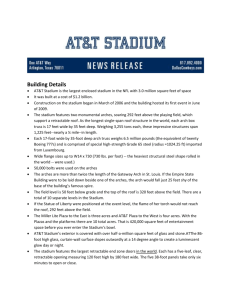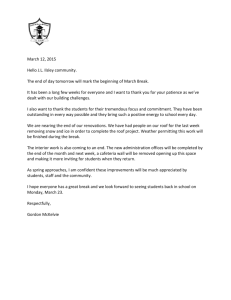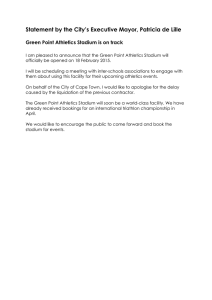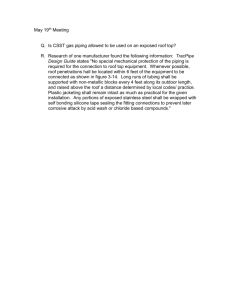Raising A Roof: 4 Ideas Air Cell
advertisement
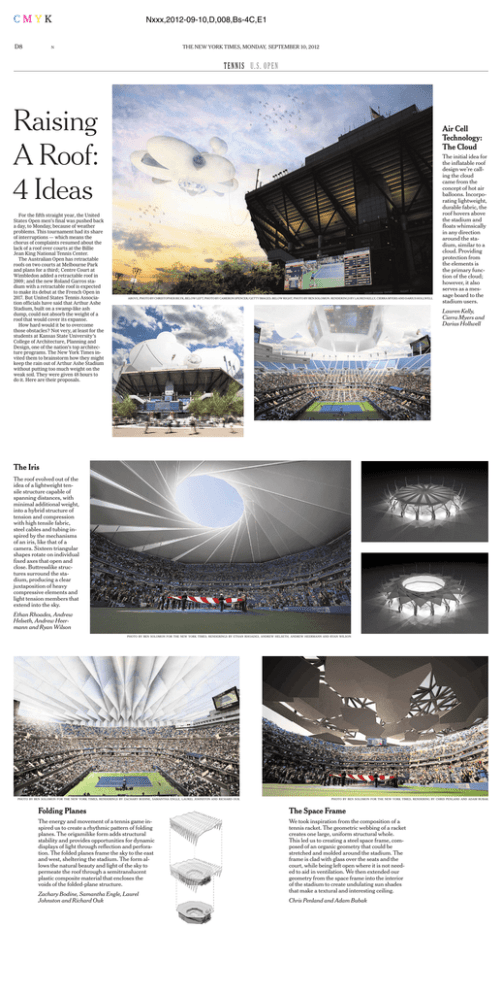
CMYK D8 Nxxx,2012-09-10,D,008,Bs-4C,E1 THE NEW YORK TIMES, MONDAY, SEPTEMBER 10, 2012 N T E N N I S U. S . O P E N Raising A Roof: 4 Ideas For the fifth straight year, the United States Open men’s final was pushed back a day, to Monday, because of weather problems. This tournament had its share of interruptions — which means the chorus of complaints resumed about the lack of a roof over courts at the Billie Jean King National Tennis Center. The Australian Open has retractable roofs on two courts at Melbourne Park and plans for a third; Centre Court at Wimbledon added a retractable roof in 2009; and the new Roland Garros stadium with a retractable roof is expected to make its debut at the French Open in 2017. But United States Tennis Association officials have said that Arthur Ashe Stadium, built on a swamp-like ash dump, could not absorb the weight of a roof that would cover its expanse. How hard would it be to overcome those obstacles? Not very, at least for the students at Kansas State University’s College of Architecture, Planning and Design, one of the nation’s top architecture programs. The New York Times invited them to brainstorm how they might keep the rain out of Arthur Ashe Stadium without putting too much weight on the weak soil. They were given 48 hours to do it. Here are their proposals. Air Cell Technology: The Cloud ABOVE, PHOTO BY CHRISTOPHER BILYK; BELOW LEFT, PHOTO BY CAMERON SPENCER/GETTY IMAGES; BELOW RIGHT, PHOTO BY BEN SOLOMON. RENDERINGS BY LAUREN KELLY, CIERRA MYERS AND DARIUS HOLLWELL The initial idea for the inflatable roof design we’re calling the cloud came from the concept of hot air balloons. Incorporating lightweight, durable fabric, the roof hovers above the stadium and floats whimsically in any direction around the stadium, similar to a cloud. Providing protection from the elements is the primary function of the cloud; however, it also serves as a message board to the stadium users. Lauren Kelly, Cierra Myers and Darius Hollwell The Iris The roof evolved out of the idea of a lightweight tensile structure capable of spanning distances, with minimal additional weight, into a hybrid structure of tension and compression with high tensile fabric, steel cables and tubing inspired by the mechanisms of an iris, like that of a camera. Sixteen triangular shapes rotate on individual fixed axes that open and close. Buttresslike structures surround the stadium, producing a clear juxtaposition of heavy compressive elements and light tension members that extend into the sky. Ethan Rhoades, Andrew Helseth, Andrew Heermann and Ryan Wilson PHOTO BY BEN SOLOMON FOR THE NEW YORK TIMES; RENDERINGS BY ETHAN RHOADES, ANDREW HELSETH, ANDREW HEERMANN AND RYAN WILSON PHOTO BY BEN SOLOMON FOR THE NEW YORK TIMES; RENDERINGS BY ZACHARY BODINE, SAMANTHA ENGLE, LAUREL JOHNSTON AND RICHARD OUK PHOTO BY BEN SOLOMON FOR THE NEW YORK TIMES; RENDERING BY CHRIS PENLAND AND ADAM BUBAK Folding Planes The Space Frame The energy and movement of a tennis game inspired us to create a rhythmic pattern of folding planes. The origamilike form adds structural stability and provides opportunities for dynamic displays of light through reflection and perforation. The folded planes frame the sky to the east and west, sheltering the stadium. The form allows the natural beauty and light of the sky to permeate the roof through a semitranslucent plastic composite material that encloses the voids of the folded-plane structure. We took inspiration from the composition of a tennis racket. The geometric webbing of a racket creates one large, uniform structural whole. This led us to creating a steel space frame, composed of an organic geometry that could be stretched and molded around the stadium. The frame is clad with glass over the seats and the court, while being left open where it is not needed to aid in ventilation. We then extended our geometry from the space frame into the interior of the stadium to create undulating sun shades that make a textural and interesting ceiling. Zachary Bodine, Samantha Engle, Laurel Johnston and Richard Ouk Chris Penland and Adam Bubak
